Last week we told you about protein, and how it's one of the most important tools in the arsenal of any athlete, regardless of pursuit. But the truth is that lots of people are still sceptical about protein, its uses and benefits, perceived dangers and downsides, sources of protein, and more. So this week, we're going to bust a few myths about protein.
1. You can't get enough protein from a vegetarian/vegan diet
We'll start with a classic, and that's the idea that to get enough protein, you have to eat meat. Put simply, this just isn't true... If you're a vegetarian or a vegan, you still have access to plenty of great protein sources. Yes, many of the "classic" protein foods are not usually vegan/vegetarian-friendly, such as chicken, beef, turkey etc. But, there are plenty of alternatives, a great vegetarian option would be eggs, and whilst veganism requires a little more creativity, there are plenty of plant-based alternatives to meat-based protein. Not only is there tofu, lentils and chickpeas, there are also soy proteins and plenty of nutrition companies even manufacture vegetarian and vegan proteins supplements. Our very own KMC PRO MIX is a fantastic vegetarian option that packs in an awesome 21g of protein. With enough research and knowledge, anyone can take on a vegetarian or vegan diet and still get all the protein they need. Check out our most recent discussion of how Veganuary can impact your training and exercise! The only thing to be mindful of, is that many plant-based protein sources don't contain the same amount of essential amino acids compared with animal-based protein, so it's a good idea to think about this when you're supplementing, maybe try a BCAA powder!
2. Eating more protein will make me gain weight
Another common misconception about protein is that it can lead to weight gain/unwanted increases in size, particularly in women. The truth is that your weight is almost exclusively dependant on your calorie intake. If you eat more calories than your body needs to sustain itself, you'll gain weight over time. Likewise, eating in a calorie deficit will see you lose weight over time. Eating protein alone won't necessarily drive weight gain, only eating more calories than you need will do this. What many people don't know is that protein can actually be a great tool for weight loss. Protein is more satiating than other foods, which means it will leave you feeling fuller for longer, which can help you overcome hunger, prevent snacking and ultimately benefit your weightloss goals. Not only that, your body uses up more energy processing protein than it does other foods. When you eat protein, your body needs about 20-30% of that energy just to digest it. That's compared to 5-10% in carbs and between 0-3% of fat. Essentially, if you eat 100 calories of protein, you'll burn 20-30 of those just digesting the protein, which will benefit weight-loss. Not all calories are created equal.
3. I don't need to eat protein if I drink protein shakes
Protein powders and shakes are by definition "supplements". That means you should be using them to supplement a balanced diet. We certainly believe that protein power is great tool for any athlete (that's why we make it) - but that doesn't mean that you should omit other protein sources from your diet. There's absolutely no reason that you shouldn't use protein shakes and powders to supplement your diet, just remember that they are supplements, so make sure you're getting all the protein you need from a variety of sources.
4. Protein is great for bodybuilders, but not much else
Not so fast! Yes, bodybuilders love protein, but that's because it helps to aid in recovery after exercise, by helping muscles to rebuild and repair. To that end, protein should be a vital component in the diet of anyone doing any kind of exercise, be it running, swimming, cycling. If it involves being active, and your body feels tired at the end of it, then protein is for you. And protein isn't just for your muscles, your bones, joints, ligaments, tendons, teeth, hair, hormones and immune system also rely on protein to function. Endurance athletes in particular, need protein to maintain lean muscle mass!
5. The body can only digest 20-30g of protein at a time
It has been suggested that your body can only really digest about 20-30g of protein per meal/sitting and that any more than that simply goes to waste. However, it's actually been suggested that the body can adapt to the amount of protein presented to it in each meal to make the most of what you give it. According to training and nutrition expert Mark Grice, if you ate a meal with 50g of protein in it, your body would slow down digestion in order to make the most of the protein available. So whilst it's definitely a good idea to spread your protein intake throughout the day, don't worry about skipping out on higher protein meals, your body will know what to do with it!
6. One size fits all?
When it comes to protein, one size definitely doesn't fit all. The amount of protein you need depends on a number of factors, including your age, your height and weight, your goals (whether you're trying to lose weight, maintain muscle mass, or build muscle) and more. All of that means that no two people are alike when it comes to their protein needs, which is why it's really important that you do your own research, mindful of your own goals and your body when you're thinking about how much protein you need.
Why not try our KMC PRO MIX?
With a fantastic 20g of protein and just the right amount of carbs to help your body make the most of it, our KMC PRO MIX is a superb recovery powder. And because it's based on the traditional recipe for Kendal Mint Cake, it has a phenomenal minty chocolate taste that will leave you craving more!
Check out our KMC PRO MIX recovery powder in delicious chocolate mint now!





